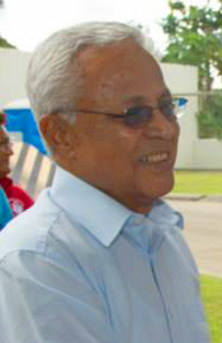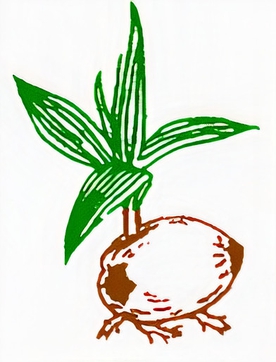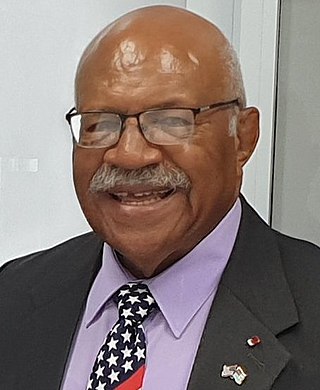Tulsi Ram Khelwan is a Fijian political leader [1] of Indian descent. He served in the Senate from 2002 to 2006 as one of eight nominees of the Leader of the Opposition.
Tulsi Ram Khelwan is a Fijian political leader [1] of Indian descent. He served in the Senate from 2002 to 2006 as one of eight nominees of the Leader of the Opposition.

Fiji, officially the Republic of Fiji, is an island country in Melanesia, part of Oceania in the South Pacific Ocean. It lies about 1,100 nautical miles north-northeast of New Zealand. Fiji consists of an archipelago of more than 330 islands—of which about 110 are permanently inhabited—and more than 500 islets, amounting to a total land area of about 18,300 square kilometres (7,100 sq mi). The most outlying island group is Ono-i-Lau. About 87% of the total population of 924,610 live on the two major islands, Viti Levu and Vanua Levu. About three-quarters of Fijians live on Viti Levu's coasts: either in the capital city of Suva; or in smaller urban centres such as Nadi—where tourism is the major local industry; or in Lautoka, where the sugar-cane industry is dominant. The interior of Viti Levu is sparsely inhabited because of its terrain.
George Speight is a Fijian businessman and politician who was the leader of the 2000 Fijian coup d'état, in which he and rebel soldiers from Fiji's Counter Revolutionary Warfare Unit seized the Fijian Parliament and held Prime Minister Mahendra Chaudhry and 35 other MP's hostage from 19 May 2000 to 13 July 2000. After being convicted of treason for leading the coup, he is currently serving a sentence of life imprisonment.

Mahendra Pal Chaudhry is a Fijian politician and the leader of the Fiji Labour Party. Following a historic election in which he defeated the long-time former leader, Sitiveni Rabuka, the former trade union leader became Fiji's first Indo-Fijian Prime Minister on 19 May 1999, but exactly one year later, on 19 May 2000 he and most of his Cabinet were taken hostage by coup leader George Speight, in the Fiji coup of 2000. Unable to exercise his duties, he and his ministers were sacked by President Ratu Sir Kamisese Mara on 27 May; Mara intended to assume emergency powers himself but was himself deposed by the military leader, Commodore Frank Bainimarama.

Laisenia Qarase was a Fijian politician. He served as the sixth Prime Minister of Fiji from 2000 to 2006. After the military quashed the coup that led to the removal of Mahendra Chaudhry, Qarase joined the Interim Military Government as a financial adviser on 9 June 2000, until his appointment as Prime Minister on 4 July. He won two parliamentary elections, but a military coup removed him from power on 5 December 2006. He was later imprisoned on corruption charges brought by the military-backed regime.

The Fiji Labour Party, also known as Fiji Labour, is a political party in Fiji. Most of its support is from the Indo-Fijian community, although it is officially multiracial and its first leader was an indigenous Fijian, Dr. Timoci Bavadra. The party has been elected to power twice, with Timoci Bavadra and Mahendra Chaudhry becoming prime minister in 1987 and 1999 respectively. On both occasions, the resulting government was rapidly overthrown by a coup.

The Senate of Fiji was the upper chamber of Parliament. It was abolished by the 2013 Constitution of Fiji, after a series of military coups. It was the less powerful of the two chambers; it could not initiate legislation, but could amend or veto it. The Senate's powers over financial bills were more restricted: it could veto them in their entirety, but could not amend them. The House of Representatives could override a Senatorial veto by passing the bill a second time in the parliamentary session immediately following the one in which it was rejected by the Senate, after a minimum period of six months. Amendments to the Constitution were excepted: the veto of the Senate was absolute. Following the passage of a bill by the House of Representatives, the Senate had 21 days to approve, amend, or reject it; if at the expiry of that period the Senate had done nothing about it, it was deemed to have passed the bill.

The prime minister of Fiji is the head of government of the Republic of Fiji. The prime minister is appointed under the terms of the 2013 Constitution. The prime minister is the head of the Cabinet and appoints and dismisses ministers.

The Great Council of Chiefs(Bose Levu Vakaturaga in Fijian) was a constitutional body in Fiji from 1876 to March 2012. In April 2007, the council was suspended, due to an unworkable relationship with Frank Bainimarama, leader of an "interim government" that came to power through military coup in December 2006. It was formally disestablished by decree in March 2012.

Sitiveni Ligamamada Rabuka is a Fijian politician who has served as Prime Minister of Fiji since 24 December 2022. He was the instigator of two military coups in 1987. He was democratically elected as Prime Minister of Fiji, serving from 1992 to 1999, and again in 2022, leading a three-party coalition. He also served as Chairman of the Great Council of Chiefs from 1999 to 2001, and later as Chairman of the Cakaudrove Provincial Council from 2001 to 2008.

Josaia Voreqe "Frank" Bainimarama is a Fijian politician and former naval officer who served as the prime minister of Fiji from 2007 until 2022. A member of the FijiFirst party, which he founded in 2014, he began his career as an officer in the Fijian navy and commander of the Fijian military. He has been serving as the opposition leader since 24 December 2022.

The National Federation Party is a Fijian political party founded by A.D. Patel in November 1968, as a merger of the Federation Party and the National Democratic Party. Though it claimed to represent all Fiji Islanders, it was supported, in practice, almost exclusively by Indo-Fijians whose ancestors had come to Fiji between 1879 and 1916, mostly as indentured labourers. However, in the 2018 general election, the party recorded a considerable change in its support base due to the inclusion of more indigenous Fijian candidates.

The Parliament of the Republic of Fiji is the unicameral legislature of the Republic of Fiji. It consists of 55 members elected every 4 years using open list proportional representation in one multi-member nationwide constituency.
Ratu Naiqama Tawake Lalabalavu is a Fijian Paramount Chief and the current speaker of the parliament. He had served as the leader of the opposition.

The Fiji coup d'état of 2000 was a civilian coup d'état by hardline i-Taukei nationalists against the elected government of an Indo-Fijian Prime Minister, Mahendra Chaudhry on 19 May 2000. This was followed by an attempt on 27 May by President Ratu Sir Kamisese Mara to assert executive authority, and then by a military coup on 29 May by Republic of Fiji Military Forces Commander Commodore Frank Bainimarama. The coups resulted in the removal of the elected government and its replacement by an interim regime headed by Josefa Iloilo. In March 2001 the Court of Appeal of Fiji ruled that the coups and interim regime were illegal. An elected government was finally restored by the 2001 Fijian general election.

General elections were held in Fiji between 6 and 13 May 2006.
Anti-Hindu sentiment, also known as Hinduphobia, is a negative perception, sentiment or actions against the practitioners of Hinduism.

The Fijian coup d'état of December 2006 was a coup d'état in Fiji carried out by Commodore Frank Bainimarama, Commander of the Republic of Fiji Military Forces (RFMP), against Prime Minister Laisenia Qarase and President Josefa Iloilo. It was the culmination of a political crisis that started the previous year, when the Qarase government introduced three bills to the Fijian Parliament. The Qoliqoli, Land Tribunal, and Reconciliation, Tolerance, and Unity Bills dealt with the ongoing ethnic conflicts in Fiji and the aftermath of the 2000 coup, and were considered to be pro-ethnic Fijian. Bainimarama presented the government with a list of demands on October 16 that included withdrawing the bills. Attempts at negotiation failed and the military launched the coup on 4 December. Parliament was dissolved, Qarase and his cabinet were dismissed, and some civilian officials were placed under house arrest. After the Great Council of Chiefs refused to appoint a cabinet friendly to the military, Bainimarama reached an understanding with Iloilo and reinstated him as President on 4 January 2007. Iloilo then appointed Bainimarama acting Prime Minister in charge of the Interim Cabinet.
Indo-Fijians are Fijian citizens of South Asian descent, and include people who trace their ancestry to various regions of the South Asian subcontinent. Although Indo-Fijians constituted a majority of Fiji's population from 1956 through the late 1980s, discrimination and the resulting brain drain resulted in them numbering 313,798 (37.6%) out of a total of 827,900 people living in Fiji as of 2007.

The Commander of the Republic of Fiji Military Forces is the highest-ranking military officer of in the Republic of Fiji Military Forces, who is responsible for maintaining the operational command of the military. The current commander is Major General Jone Kalouniwai.